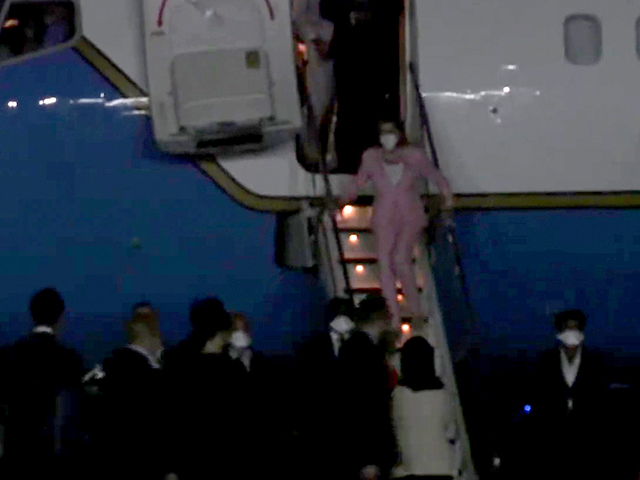
“For if the trumpet give an uncertain sound,” the Bible warns us, “who shall prepare himself to the battle?” Without a doubt, weak leaders give uncertain sounds, and so they end up with few followers.
A case in point is President Joe Biden. Not only is he struggling with a record-low approval rating, he’s even having trouble with his fellow Democrat and presumed ally in government, Speaker of the House Nancy Pelosi. Biden had quietly opposed Pelosi’s August 2 trip to Taiwan, and yet Pelosi went anyway, bringing along with her four other House Democrats, including Rep. Gregory Meeks (D-NY), chair of the House Foreign Affairs Committee. Potent symbolism there.
Of course, the trip was made even more fraught by the virulent opposition of the Chinese Communist Party regime in Beijing, which imperiously claims authority over Taiwan. Ever since, China has been conducting menacing military “drills” in the area–including edgy missile launches in the direction of other Asian countries, including Japan. And just on August 14 comes the news that a second Congressional delegation has arrived in Taiwan, this one led by Sen. Ed Markey (D-MA). And then, as the night follows the day, China announced a new round of military “drills” meant to intimidate. Back in Washington, D.C., on August 16, the Chinese ambassador to the U.S., Qin Gang, delivered a 90-minute tirade, described by Politico as “doubling down” on the flashpoint. Qin accused Pelosi of “political provocation” and of “changing the status quo”–the implication being that China could change it some more.
So yes, Pelosi’s visit to Taiwan continues to echo. And there’s more. Just on August 11, The Daily Mail (U.K.) scooped that Pelosi’s businessman son, Paul, had been on his mother’s plane. The family-symbolism is hard to miss: Paul Pelosi is a made man. Indeed, it seems that Paul Pelosi is a large shareholder in a Chinese telecom company. Hmm. The business-minded son of a Democratic big shot riding around on U.S. government planes. It all sounds a bit . . . Hunter Biden-ish–well, yes, it does, doesn’t it?
Questions of nepotism and influence peddling aside, probably most Americans support the current U.S. policy of support for Taiwan, even it’s not clear exactly what we support. And that’s largely by design: for half a century, U.S policy on Taiwan has been characterized as “strategic ambiguity.” That is, leave China guessing as to exactly what we would, or would not do, in regard to the defense of Taiwan. And for his part, Biden, too, seems to be guessing. He has said, three times, that the U.S. would actively defend Taiwan–and walked it back three times.
All of which led The Economist magazine to call out this “incoherence.” The London-based publication opined, “The trip is a symptom of America’s incoherent approach to China—the country’s single most important opponent in the long run. If so, a trip designed to convey strength risks instead showing up the Biden administration’s confusion and lack of purpose.” Ouch!
In fact, the behind-the-scenes dispute between the two top Democrats had been bubbling for some time. Back on July 20, Biden answered a reporter’s question about the pending trip in a desultory manner: “The military thinks it’s not a good idea right now. But I don’t know what the status of it is.”
The New York Times explained, “Mr. Biden’s aides said he had decided against asking Ms. Pelosi directly to cancel her trip.” So instead, the communications about the trip occurred indirectly. CNBC reported, “The White House and the Pentagon have made little secret of their opposition to such a visit, which comes at a time when U.S.-China relations are the poorest they’ve been in decades.” In the middle of this mix, on July 29, Niall Ferguson, a distinguished scholar of foreign affairs boasting joint appointments at both Stanford and Harvard, pointed out that Pelosi’s trip was first announced in April. He asked: “Why did the Pentagon take three months to figure out that a trip by the House speaker to Taiwan was ‘not a good idea’?”

House Speaker Nancy Pelosi landing at Songshan Airport in Taipei, Taiwan, on August 2, 2022. (Taiwanese Foreign Ministry via Getty Images)
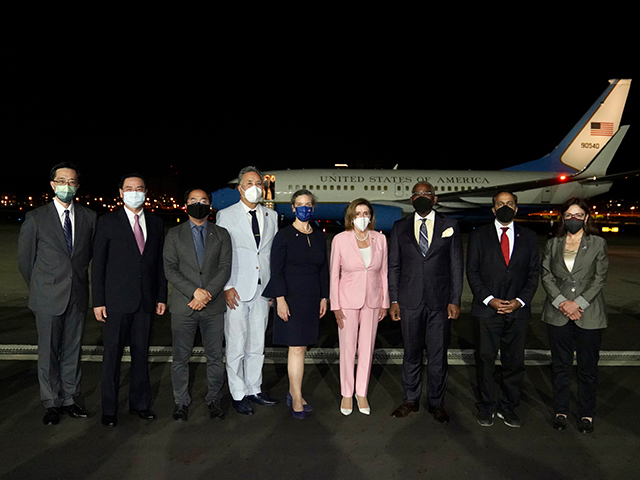
House Speaker Nancy Pelosi, center, poses for photos after arriving in Taipei, Taiwan, on Aug. 2, 2022. (Taiwan Ministry of Foreign Affairs via AP)
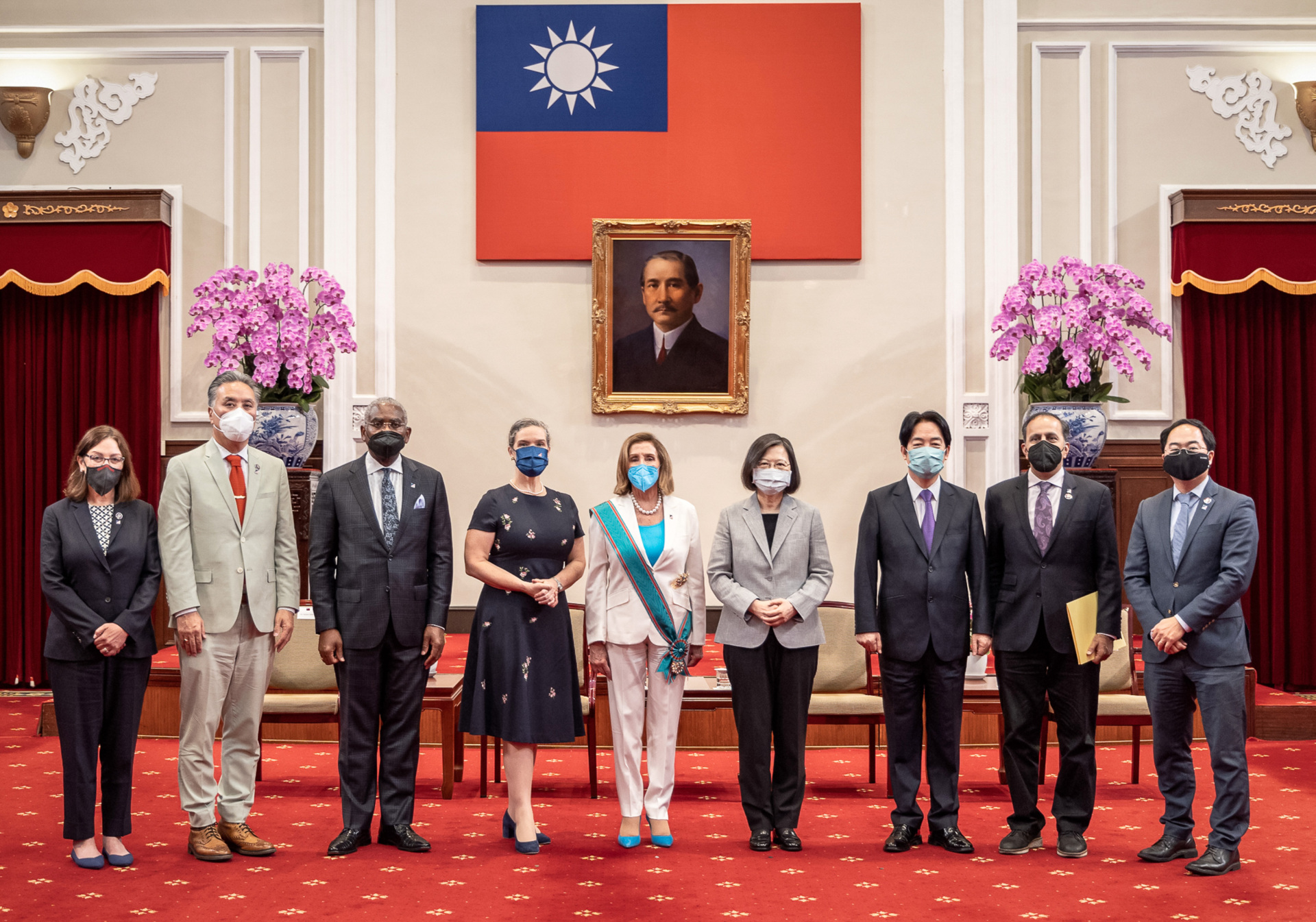
U.S. House Speaker Nancy Pelosi (D-CA), center left, poses for photographs after receiving the Order of Propitious Clouds with Special Grand Cordon, Taiwan’s highest civilian honor, from Taiwan’s President Tsai Ing-wen, center right, at the president’s office on August 3, 2022, in Taipei, Taiwan. (Chien Chih-Hung/Office of The President via Getty Images)
On August 1, the day before Pelosi’s scheduled arrival in Taiwan, New York Times columnist Thomas Friedman opined that Pelosi’s looming visit was “utterly reckless, dangerous and irresponsible.” It’s a good bet that Friedman wouldn’t have written that if the White House had wanted him not to. Friedman, winner of three Pulitzer Prizes, is probably more wired into the foreign policy establishment, including the Biden administration, than any other journalist. Why, just on May 22 he wrote a column bragging about his private lunch with Biden, noting that it was off the record, and yet still teasing the gist of his conversation with the commander-in-chief.
Which is to say, Friedman speaks with great authority about the Biden administration. So it was revealing that he wrote, in that column on the 1st, “It is a measure of our political dysfunction that a Democratic president cannot deter a Democratic House speaker from engaging in a diplomatic maneuver that his entire national security team—from the C.I.A. director to the chairman of the Joint Chiefs—deemed unwise.” [emphasis added]
In other words, the optics of the trip had became a muddle, as Biden jousted with Pelosi via proxy, even as the Beijing regime sent ships and airplanes to encircle the island of Taiwan. Breitbart News’ August 2 headline thus nailed it: “Nancy Pelosi Lands in Taiwan, Defies Biden Administration and China.”
For her part, just on August 11, Pelosi added some new fuzz to the ball of confusion, telling reporters of the U.S. military’s stance toward her trip, “I don’t remember them ever telling us not to go.” So is it possible that the Biden administration didn’t want Pelosi to go and didn’t dare so it? That even secretaries and generals and admirals were unwilling to confront the speaker, even indirectly? How is anyone supposed to know Biden policy if the Bidenites won’t say it out loud?
So let’s go back to that word that Friedman used above: “dysfunction.” The word rings a bell with this author, as it’s so close—a rhyme, in fact—to the political science word “disjunction.” Disjunction describes a political organization that’s unable to function and so is coming apart. Disjunction is a concept commonly applied to the presidency of Jimmy Carter (1977-1981), which I am old enough to remember well. As with Carter’s 39th presidency, Biden’s 46th presidency suffers from a bad case of disjunction. That is, the trumpet makes its weak sound, and few hear it, or heed it. Indeed, plenty of fellow Democrats are now telling Biden that he should soon stop sounding the trumpet altogether—that he should not run again.
As a matter of fact, I’ve written no fewer than eleven articles in the past year-and-a-half exploring the parallels between the Carter and Biden administrations, spotlighting topics including inflation, immigration, and energy policy. Today we can spotlight a twelfth parallel, concerning disjunction in policy toward a rival superpower.
So let’s take a little time-jaunt back to the late 1970s, when President Carter was trying to manage fellow Democrats while attempting to deal with the then-mighty Soviet Union. Carter came into office with high hopes for his liberal agenda; he reckoned that the new broom of his enlightened diplomacy would sweep away the cobwebs of the Cold War.
To that end, early in his presidency, in May 1977, he delivered a commencement speech to the University of Notre Dame in which he dumped on cold warriors, declaring instead, “We are now free of that inordinate fear of Communism.” Got that? The communists weren’t so bad. And so of course Carter signed an arms control treaty, known as SALT II, with the Soviets. That was in June 1979. To seal the deal, a kiss.
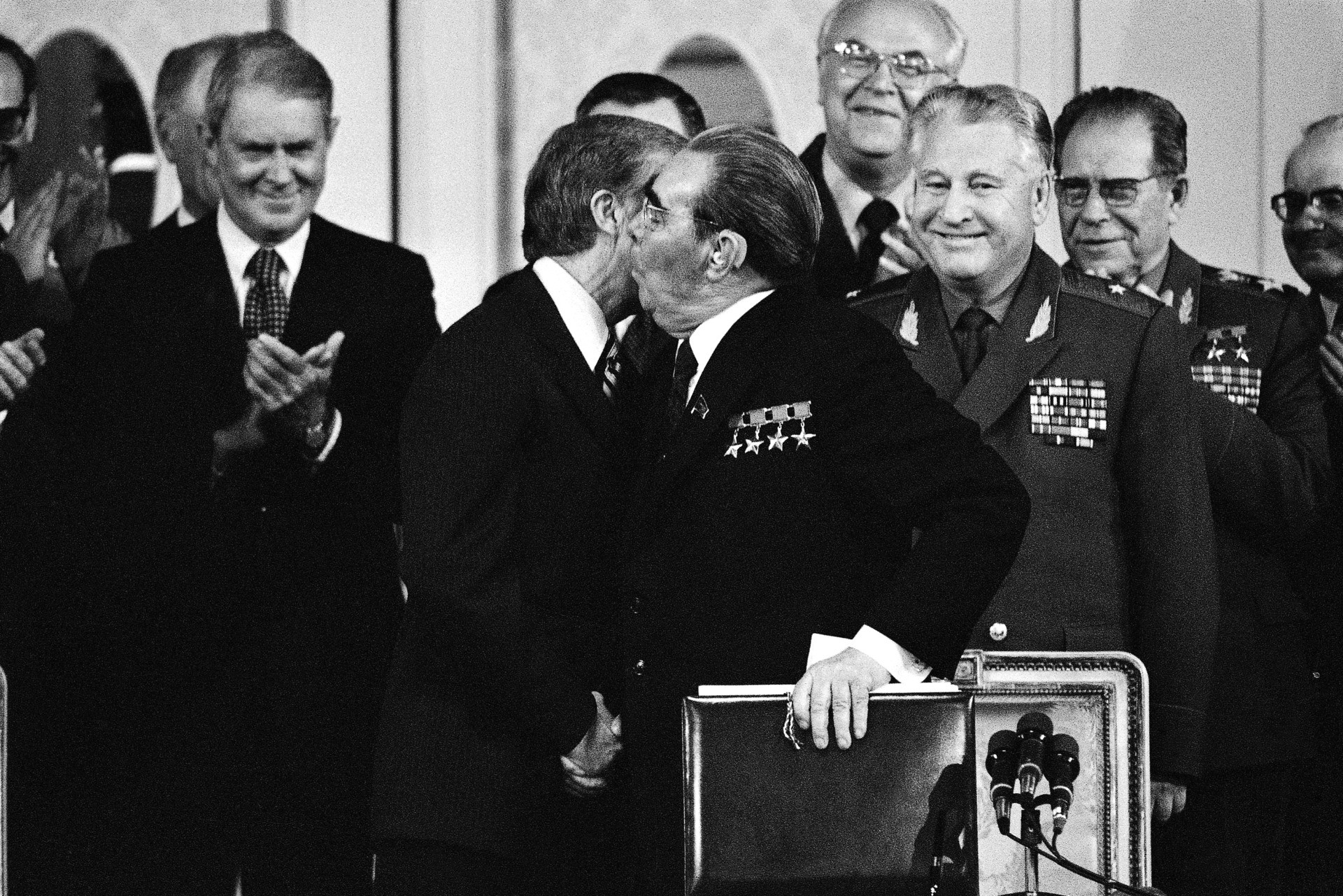
Soviet President Leonid Brezhnev (right) kisses U.S. President Jimmy Carter (left) after both leaders signed the SALT II Treaty in Vienna, Austria, on June 18, 1979. (AP Photo)
Now we should add that when the 96th Congress first met in January 1979, it boasted a thumping majority of 58 Democratic senators. So later that year, when he submitted the SALT II treaty to the Senate for ratification, Carter had good reason to think that he would win the vote.
However, disjunction was already settling in. Carter hadn’t gotten along with his fellow Democrats, and so didn’t factor properly their sentiments on the Soviets. In fact, many of them thought that SALT II was a dangerous giveaway to Moscow. According to the State Department’s official history of the negotiations, “a broad coalition of Republicans and conservative Democrats grew increasingly skeptical.” One of those skeptical Democrats was Sen. Russell Long (D-LA), a thirty-year veteran of the chamber, chair of the mighty Finance Committee.
So Carter had his treaty, and Long had his opinion of it—and the twain did not meet. Here’s what the Washington Post reported on September 13, 1979:
Sen. Russell B. Long (D-La.), one of the most influential members of the Senate, announced yesterday that he would vote against the SALT II pact, declaring that it cannot be verified and that Soviet combat troops in Cuba demonstrated Soviet bad faith. Through Long had spoken critically of SALT II in the past, the Carter administration had hoped for his vote, and most of its optimistic projections for Senate approval of the arms treaty assumed Long’s eventual support.
In other words, the Carter administration had miscalculated. It had hoped Long’s support—and didn’t get it. That’s disjunction, made visible.
As a relevant aside, Joe Biden was in the Senate back then. Indeed, as the Washington Post also reported, the Delaware lawmaker, a strong supporter of the president—he had been the first senator to endorse candidate Carter—visited Moscow, looking for ways to save the treaty.
With Biden’s help, Carter stuck with SALT II until the end of 1979. But then, on December 25 of that year, the Soviet Union invaded Afghanistan. So by now it was obvious that there was nothing “inordinate” about the fear of communism. Such fear, and loathing, was, in fact, quite ordinate and rational. In early January 1980, Carter bowed to political, and geopolitical, reality: He asked the Senate not to consider SALT II, that being a face-saving way of staving off an outright defeat. Okay, so that was Jimmy Carter’s rendezvous with disjunction—one of them.
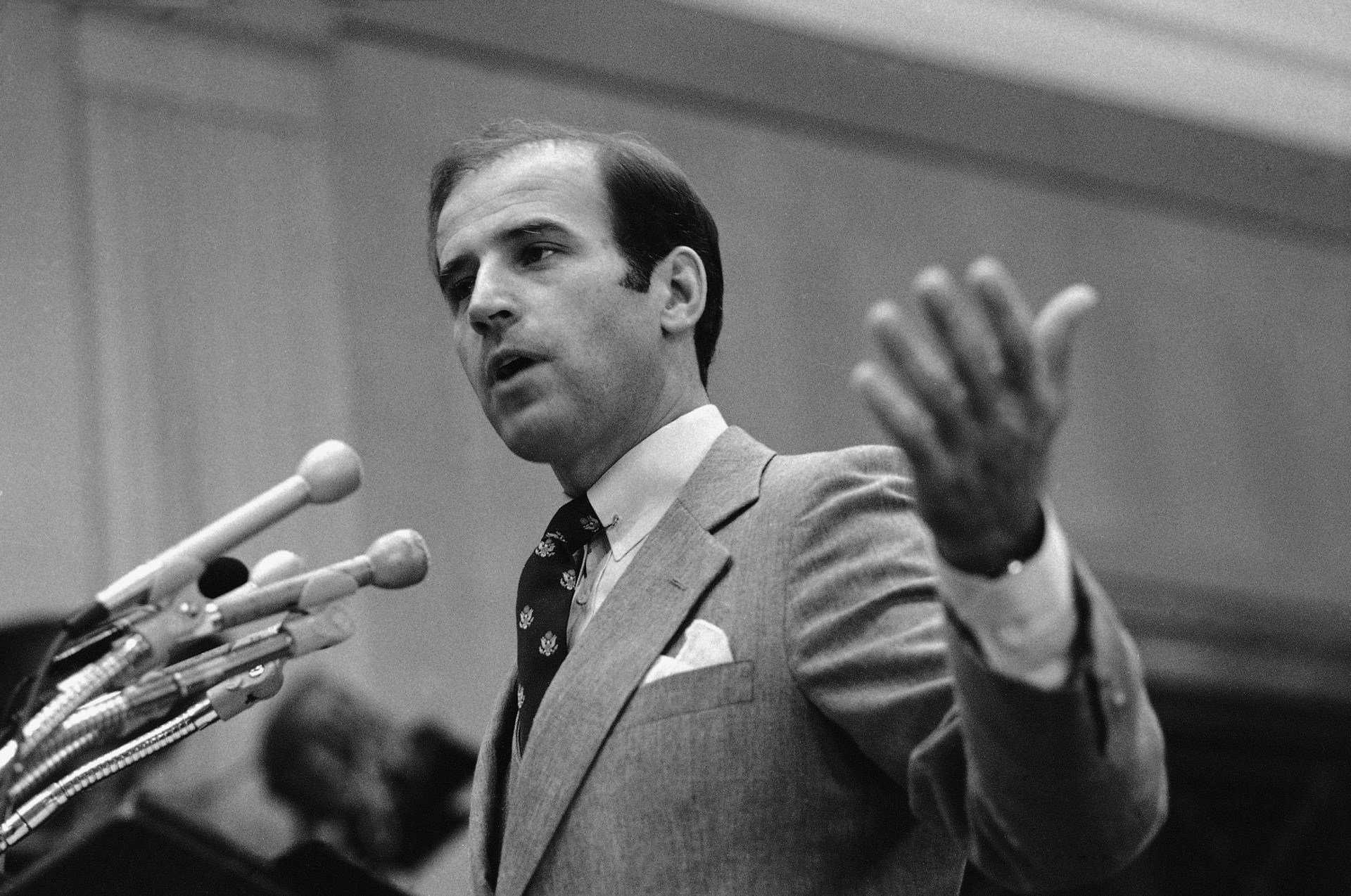
Sen. Joe Biden (D-DE) tells a Washington press conference that ratification of the Salt II treaty is vital to American security, on October 9, 1979. (AP Photo/ Charles Harrity)
Now back to the present day. As we have seen, Biden can’t rely on Pelosi on a key international issue—which is arguably the international issue. Indeed, the China issue is so important that it has caused a rift on the Republican side, too. Senate Minority Leader Mitch McConnell (R-KY) and 25 other Republican senators co-signed a letter expressing their support for Pelosi’s trip to Taiwan.
To be sure, support for Taiwan has long been a conservative tenet. Still, if a little more than of the Senate Republican Conference publicly supports Pelosi’s trip to Taiwan, then that means that a little less than half of the Senate Republicans hold some other position. And as for what those other positions might be, it’s best to let each GOP senator speak for him- or herself. But one who has made himself loud and clear is Sen. Ted Cruz of Texas, who released his own statement, supporting Pelosi’s trip while bashing Biden’s reaction to it:
Speaker Pelosi was right to visit Taiwan. The Biden White House has managed to make an absolute mess of this, including leaking that the Biden Defense Department opposed Speaker Pelosi traveling to Taiwan, and then absurdly refusing to make unequivocally clear that any threats of violence against the Speaker would be met with overwhelming consequences.
As Mark Twain said, history doesn’t repeat, but it does rhyme. And so just as surely as “dysfunction” rhymes with “disjunction,” Joe Biden is rhyming with Jimmy Carter. Neither man proved able to manage their own coalition, to say nothing of the nation. All of which suggests that as with Carter before him, Biden’s time in the White House has a one-term ceiling.
So no later than January 2025, all the issues and concerns about China will be there to greet the next president.




